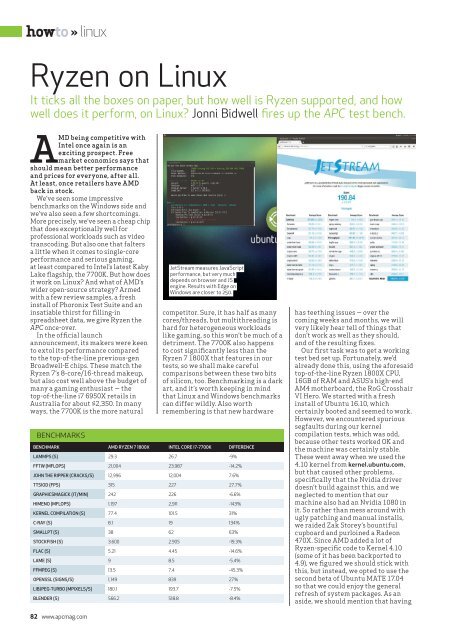You also want an ePaper? Increase the reach of your titles
YUMPU automatically turns print PDFs into web optimized ePapers that Google loves.
howto » linux<br />
Ryzen on Linux<br />
It ticks all the boxes on paper, but how well is Ryzen supported, and how<br />
well does it perform, on Linux? Jonni Bidwell fires up the <strong>APC</strong> test bench.<br />
AMD being competitive with<br />
Intel once again is an<br />
exciting prospect. Free<br />
market economics says that<br />
should mean better performance<br />
and prices for everyone, after all.<br />
At least, once retailers have AMD<br />
back in stock.<br />
We’ve seen some impressive<br />
benchmarks on the Windows side and<br />
we’ve also seen a few shortcomings.<br />
More precisely, we’ve seen a cheap chip<br />
that does exceptionally well for<br />
professional workloads such as video<br />
transcoding. But also one that falters<br />
a little when it comes to single-core<br />
performance and serious gaming,<br />
at least compared to Intel’s latest Kaby<br />
Lake flagship, the 7700K. But how does<br />
it work on Linux? And what of AMD’s<br />
wider open-source strategy? Armed<br />
with a few review samples, a fresh<br />
install of Phoronix Test Suite and an<br />
insatiable thirst for filling-in<br />
spreadsheet data, we give Ryzen the<br />
<strong>APC</strong> once-over.<br />
In the official launch<br />
announcement, its makers were keen<br />
to extol its performance compared<br />
to the top-of-the-line previous-gen<br />
Broadwell-E chips. These match the<br />
Ryzen 7’s 8-core/16-thread makeup,<br />
but also cost well above the budget of<br />
many a gaming enthusiast — the<br />
top-of-the-line i7 6950X retails in<br />
<strong>Australia</strong> for about $2,350. In many<br />
ways, the 7700K is the more natural<br />
BENCHMARKS<br />
JetStream measures JavaScript<br />
performance, but very much<br />
depends on browser and JS<br />
engine. Results with Edge on<br />
Windows are closer to 250.<br />
competitor. Sure, it has half as many<br />
cores/threads, but multithreading is<br />
hard for heterogeneous workloads<br />
like gaming, so this won’t be much of a<br />
detriment. The 7700K also happens<br />
to cost significantly less than the<br />
Ryzen 7 1800X that features in our<br />
tests, so we shall make careful<br />
comparisons between these two bits<br />
of silicon, too. Benchmarking is a dark<br />
art, and it’s worth keeping in mind<br />
that Linux and Windows benchmarks<br />
can differ wildly. Also worth<br />
remembering is that new hardware<br />
BENCHMARK AMD RYZEN 7 1800X INTEL CORE I7-7700K DIFFERENCE<br />
LAMMPS (S) 29.3 26.7 -9%<br />
FFTW (MFLOPS) 21,004 23,987 -14.2%<br />
JOHN THE RIPPER (CRACKS/S) 12,996 12,004 7.6%<br />
TTSIOD (FPS) 315 227 27.7%<br />
GRAPHICSMAGICK (IT/MIN) 242 226 -6.6%<br />
HIMENO (MFLOPS) 1,197 2,911 -143%<br />
KERNEL COMPILATION (S) 77.4 101.5 31%<br />
C-RAY (S) 8.1 19 134%<br />
SMALLPT (S) 38 62 63%<br />
STOCKFISH (S) 3.600 2.905 -19.3%<br />
FLAC (S) 5.21 4.45 -14.6%<br />
LAME (S) 9 8.5 -5.4%<br />
FFMPEG (S) 13.5 7.4 -45.3%<br />
OPENSSL (SIGNS/S) 1,149 839 27%<br />
LIBJPEG-TURBO (MPIXELS/S) 180.1 193.7 -7.5%<br />
BLENDER (S) 566.2 518.8 -8.4%<br />
has teething issues — over the<br />
coming weeks and months, we will<br />
very likely hear tell of things that<br />
don’t work as well as they should,<br />
and of the resulting fixes.<br />
Our first task was to get a working<br />
test bed set up. Fortunately, we’d<br />
already done this, using the aforesaid<br />
top-of-the-line Ryzen 1800X CPU,<br />
16GB of RAM and ASUS’s high-end<br />
AM4 motherboard, the RoG Crosshair<br />
VI Hero. We started with a fresh<br />
install of Ubuntu 16.10, which<br />
certainly booted and seemed to work.<br />
However, we encountered spurious<br />
segfaults during our kernel<br />
compilation tests, which was odd,<br />
because other tests worked OK and<br />
the machine was certainly stable.<br />
These went away when we used the<br />
4.10 kernel from kernel.ubuntu.com,<br />
but that caused other problems,<br />
specifically that the Nvidia driver<br />
doesn’t build against this, and we<br />
neglected to mention that our<br />
machine also had an Nvidia 1080 in<br />
it. So rather than mess around with<br />
ugly patching and manual installs,<br />
we raided Zak Storey’s bountiful<br />
cupboard and purloined a Radeon<br />
470X. Since AMD added a lot of<br />
Ryzen-specific code to Kernel 4.10<br />
(some of it has been backported to<br />
4.9), we figured we should stick with<br />
this, but instead, we opted to use the<br />
second beta of Ubuntu MATE 17.04<br />
so that we could enjoy the general<br />
refresh of system packages. As an<br />
aside, we should mention that having<br />
82 www.apcmag.com


















